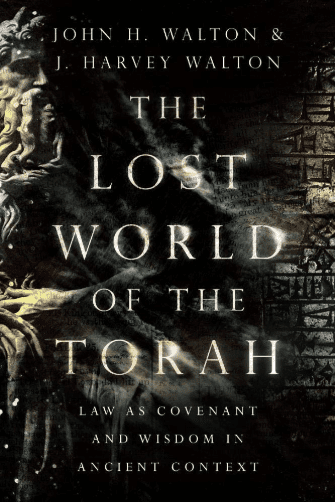 John Walton and his son J. Harvey Walton, The Lost World of the Torah, and the 5th part of their book will prove to be the most controversial.
John Walton and his son J. Harvey Walton, The Lost World of the Torah, and the 5th part of their book will prove to be the most controversial.
Why?
W&W anchor the Torah in the Ancient Near East (ANE), in the covenant God made (exclusively) with Israel (not the church, and the covenant and its legislation stipulations are about God’s presence with Israel. We are not in that covenant so what is said to that covenant people is not “to” us …
The impact of this approach to Torah can stagger some for it locates the Torah back then and only for back then. W&W are church people, Christian people, and that means people ask them about the significance of the Torah for today. Is it relevant?
It seems their answer would be: No and Yes, and what is relevant is that we learn who God is and how we can live before that God in faithfulness. This may not be enough for some, but it’s a good start.
Here are their propositions in this 5th part, some of which (16, 17, 18, 20) are not controversial (or ought not to be) and some will require much longer treatments (19, 21, 22, 23).
Proposition 15: Discussions of Law in the New Testament Do Not Tell Us Anything About Old Testament Torah in Context
A brief: one cannot equate what Jesus and the apostles mean by “law” as the same as what it meant in the ANE and OT, nor does what they say about the OT Torah equate to how it was understood in the ANE. In fact, he suggests covenant stipulations becomes more like legislation in the Hellenistic period, and that is the river in which the NT is floating. [I wanted more proof for this but contextual location arguments are important.]
Proposition 16: The Torah Should Not Be Divided into Categories to Separate Out What Is Relevant
Proposition 17: Torah Was Never Intended to Provide Salvation
Proposition 18: Divine Instruction Can Be Understood as a Metaphor of Health Rather Than a Metaphor of Law
Proposition 19: We Cannot Gain Moral Knowledge or Build a System of Ethics Based on Reading the Torah in Context and Deriving Principles from It
Propositions 20: Torah Cannot Provide Prooftexts Solving Issues Today
Proposition 21: The Ancient Israelites Would Not Have Understood the Torah as Providing Divine Moral Instruction
Proposition 22: A Divine Command Theory of Ethics Does Not Require that the Torah Is Moral Instruction
Proposition 23: Taking the Torah Seriously Means Understanding What It Was Written To Say, Not Converting It into Moral Law
I agree that dividing Torah into moral, civil, and ceremonial is artificial; Torah did not provide salvation and never intended to do; I’m not sure the health theme is all that important. The emphasis in the book is on wisdom and order. No one wants to say they are prooftexting, so that point isn’t controversial. Actually, this point emerges from already assuming the Torah has legislation that reflects God’s character and is for God’s covenanted people, including the church. Still, we’ll move on.
Decisions about the relevance and application of the Torah (as with any text of Scripture) must be made on the basis of the genre (in this case, wisdom insight rather than legislated commands), the context (written to Israel in the context of covenant and temple), the rhetorical strategy (how a section of literature functions within the larger work), the author s intention (what he intends the communication to accomplish the expected response), and the backdrop of the cultural context (understood in relation to the ancient cultural river, not ours).
Discussions, debates, and disagreements arise with the others, and it is quite unlikely that W&W are going to convince many. While I think this is the most provocative of the Lost World series, I found it in need often of more thorough proof and less in need of the Not…But rhetoric. I am not convinced Torah as wisdom and order cannot also be legislative and I’m totally unconvinced Torah needs to be comprehensive to be legislation. I’m open to being persuaded.
The relationship between the covenants — let’s say Moses and New to approximate the issue — has to be spelled out to make sense of the proposals/propositions in this book. The word “fulfill” and “telos” (goal, end, etc) require definition to connect the covenant obligations of the former with the latter.
When it comes to #19, in the main I agree: the principlization theory that Walter Kaiser was onto is not as simple as it looks, but to turn it around, its denial is not simple either.
I’m unpersuaded that morality can be divorced from wisdom, from order, from covenant stipulations and from legislation. Calling it order doesn’t negate morality. These are not reified or even reifiable categories. God’s being, God’s will, God’s law, God’s covenant with God’s redeemed people … these generate moral visions, morality and moral systems.
But I go back to the relationship of the Old and the New, the First and the Second Testaments. This is where the issues here have to be sorted out, and in this book and for this purpose W&W did not raise this into the propositional level. They can easily do this so perhaps more about this someday.
On the Torah not being about morality… it seems he’s defining a moral system by the term morality and W&W connect that to being comprehensive, natural law … Torah is not morality but instruction, and the response to instruction is comprehension, not obedience. OK, and W&W have been asked this a number of times, why not both?
As we extend these concepts beyond the scope of Israel, it is probably not unreasonable to maintain that God’s people have been given an identity with God and that it is our responsibility to honor God as we reflect him in our lives. Moral behavior would unquestionably be part of that, but only a part. The basis of this claim, however, would not be a universal revelation of the character of God in the Torah but rather an idea derived from the New Testament’s own context (i.e., the idiom “in Christ” as a declaration of identity) and the assumption of thematic recapitulation in the parallel portrayals of the church and Israel (see proposition twenty-three). Most importantly, however, this observation in itself does not help us to ascribe a particular shape to moral behavior, let alone the shape that is described in the Torah. Morality may well comprise some universal absolutes (i.e., do not steal), but it is also defined by norms that are culturally relative (i.e., do not run around naked in public). But our knowledge of the particular shape of the universal (or situationally relevant) constituents of moral behavior need not be assumed to come directly from the text of the Bible, though divine command theory admits the possibility that God’s commands can be known from general revelation, and neither the Old Testament nor the New Testament teaches that it should come from the Torah.
Their purpose is not to dictate God’s demands for our conduct but to let us know what God is doing—what his plans and purposes are—so that we can choose whether we want to participate or suffer from not participating as its own consequence.
Of the Lost World books this is both the finest attempt to show the significance of the ANE as well as the most provocative, but I believe, too, the one that will not be as convincing until some of the loose ends are tied up. I’m hoping it generates conversations about the meaning of Torah, about how Torah and covenant fit together, how Torah and law/legislation and morality fit with one another, and especially how the “ethic” of the OT fits with the ethic of the NT. Terms, of course, in need of nuancing, but the big picture is what we have in view when it comes to conversation.
W&W have taken on a huge topic, and it’s not surprising that writing at this level will leave lots of loose ends. It might be ours to pick them up and see if we can tie them together.
Maybe what we need is a clear example of how to “do Christian ethics” — say how to approach Christian and war, or Christian and same-sex relations/marriage, or the Christian and capital punishment.












